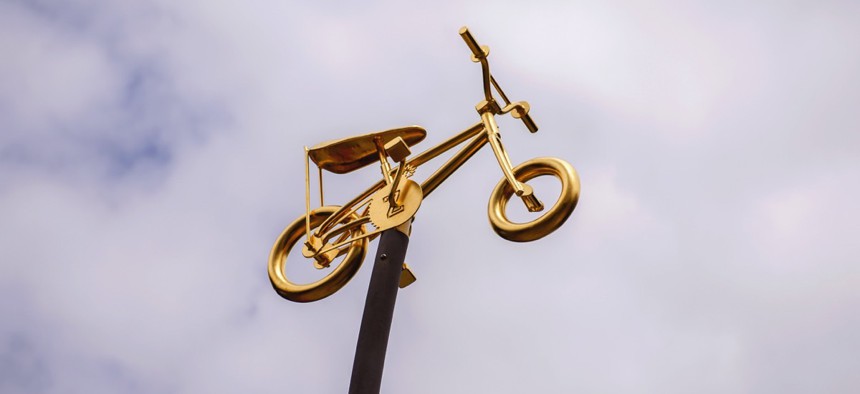Oregon (Yes, Oregon) Just Put a Tax on Bicycles

Bicycle art in Portland, Oregon.
The $15 fee on new bikes is a strange way for the state to prioritize active transit.
Oregon boasts the country’s top share of bike commuters, the first per-mile driving fee program, and some of the cleanest urban air quality. And with its newly passed transportation bill, this famously progressive playground will also be the first state with a bicycle tax.
Oregon, which does not levy regular sales taxes, will require buyers of new, adult-sized bikes priced $200 and up to pay $15 in excise taxes starting in the fall. With annual administration costs pegged at a mere $100,000, the tax is expected to raise $1.2 million a year for the Oregon DOT’s Connect Oregon program, which helps fund projects serving multiple modes of transportation.
Legislators pushing the tax—an idea that’s swirled in Oregon, Washington, and other statehouses for years—“felt that bicycles ought to contribute to the system, bicycle owners ought to contribute to the system, irrespective of the fact that most of them also own a car,” Senator Lee Beyer, who helped write the bill, told Oregon Public Broadcasting in May.
To look at bikes and declare “put a tax on it!” might appear off-brand for Oregon, typically an active transit bastion. Indeed, cycling advocates are calling BS.
“Congrats to Oregon on its preposterous bike tax that accomplishes no discernible transportation goal except dampening demand for new bikes,” writes Angie Schmitt at Streetsblog.
Fulminates Jonathan Maus at Bike Portland: “We are taxing the healthiest, most inexpensive, most environmentally friendly, most efficient, and most economically sustainable form of transportation ever devised by the human species.”
“Not even in Denmark where we tax *everything* do we have such [a thing],” the Danish transportation researcher Soren Have tweeted.
Oregon’s bike tax seems designed to address a familiar straw-man argument: that cyclists use streets without paying for them. Such a belief ignores the fact that all U.S. taxpayers pay for roads, whether or not they own cars—which most cyclists do. Furthermore, bikes’ physical impact on roads is close to nil. Some argue that bikes represent an infrastructure cost savings, in that they take heavy-bearing cars off the road.
The tax’s benefits could be outweighed by the risk to local businesses. Worse, it could warp the public’s sense of how much road-funding responsibility cyclists should bear.
Besides dissuading some potential buyers entirely, the $15 tax on costly bikes could compel others to buy lower-priced products from big-box stores, or avoid the tax entirely by shopping for used rides on Craigslist. That means local bike shops are likely to be hit hardest.
Is there any value in a bike tax? An extra million dollars per year for protected lanes is not a lot, but it could help leverage federal matching grants (if any survive the current administration), as, for example, Colorado Springs’ $4 bike excise tax has helped do for decades. And while the tax isn’t likely to silence resentful drivers entirely, it might help muffle some of the perennial gripes about sharing infrastructure costs.
But these benefits could be outweighed by the risk to local businesses. Worse, the tax could warp the public’s sense of how much road-funding responsibility cyclists should bear. It’s easy for drivers to resent cyclists for not paying their “fair share,” because the true costs of driving are largely hidden.
Drivers don’t pay for the congestion they create, or the full extent of the environmental harm they cause. They don’t see how parking is subsidized, how “free” parking makes housing and goods more expensive, and how auto-oriented sprawl makes commutes longer. To begin with, gas taxes only cover a small fraction of road upkeep.
Legislators might shift their priorities if these hidden subsidies were revealed to drivers. State policies like replacing gas taxes with per-mile driving fees—which Oregon is itself piloting—are in line with this kind of thinking. So are local policies like eliminating minimum parking requirements, enforcing developer impact fees, and establishing congestion pricing plans.
In his interview with OPD, Senator Beyer went on to argue that the bike tax is a signal that the state is placing a higher priority on bike investments. That’s a strange token of appreciation. More heartfelt would be to crank up the tax on driving.
Laura Bliss is a staff writer at CityLab, where this article was originally published.
NEXT STORY: Cost considerations in cloud migration decisions





